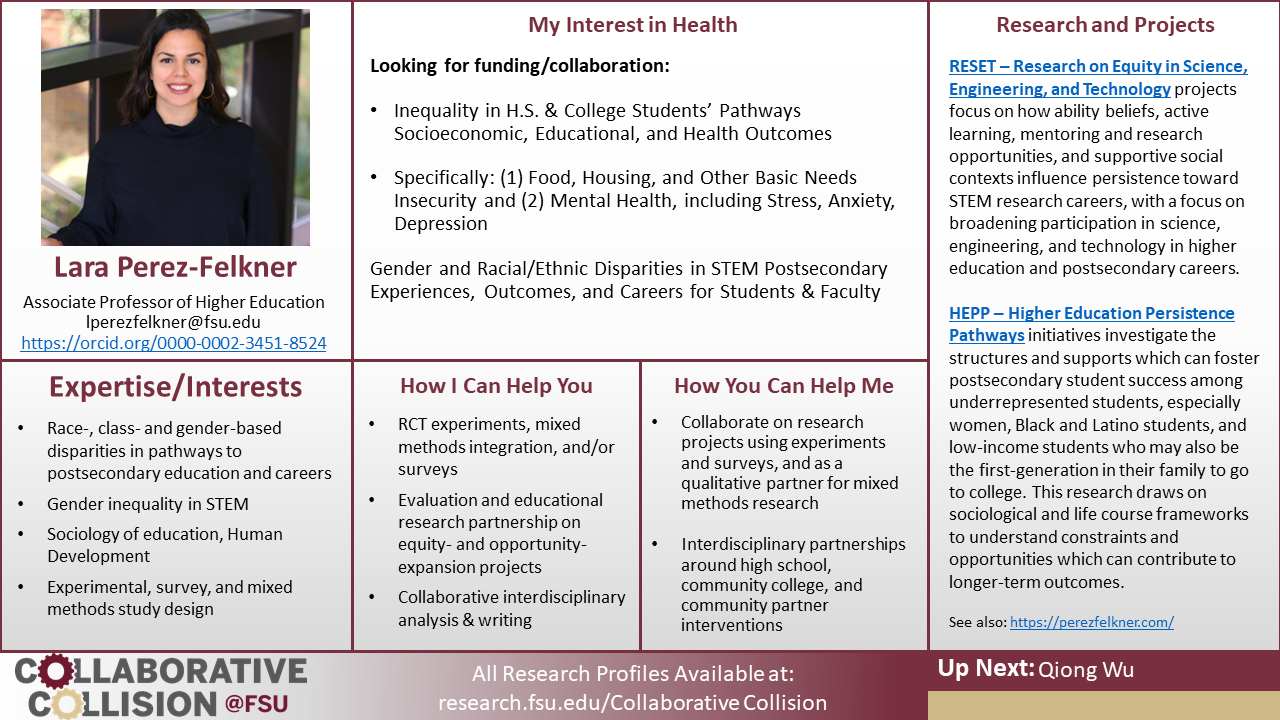Collaborative Collision: Resilience
Resilience is about being able to respond to and recover from challenging conditions, experiences, or events. In order to thrive, people, communities, organizations, systems, and universities must have an ability to rise when knocked down, to remain unconquered in the face of adversity and traumatic events. Florida State University has an established culture of Resilience, and this concept is central to the research of our faculty, taught to and embraced by students in their studies, lived by our alumni in their careers and lives, and practiced within our sports teams, arts and culture, and community work.
Collaborative Collision: Resilience featured presentations from 46 researchers interested in collaborating on resilience projects, including participants from STEM, Health, Social Sciences, and Humanities disciplines. Participant slides are available for download here, and their presentations can be viewed on YouTube.
We also welcomed Dr. Richard McCullough, newly appointed President of Florida State University, and Dr. Bill Elwood, from the National Institutes of Health, Office of Behavioral and Social Sciences Research.
Congratulations to all Collaborative Collision: Resilience finalists!
View the entire event on YouTube.
Fire Resilience
The Environmental Impact of Prescribed Burns in Florida: Soil & Emission Characteristics for Risk Mitigation
In many parts of the world -including Florida- forest disturbance regimes have intensified recently, and future climatic changes are expected to amplify this development further in the coming decades. Wildfires and
prescribed (i.e., controlled) fires are major sources of air pollution, greenhouse gases, and aerosols, and cause the formation of pyrogenic organic matter in soils, which leaches into groundwater.1-3 Focusing on Southeastern USA ecosystems, we will conduct a study to determine the impact of these fires on the environmental resilience of forests and the time to rebound specifically for Florida’s coastal sub-tropical environment.
Accelerator Winner ($50,000)
Infrastructure Resilience
Developing A Platform to Incorporate Net-Zero Targets in Upgrading Infrastructure Resilience in the Florida Panhandle
This project aims to develop a platform that integrates climate change mitigation and adaptation elements to support coastal communities’ decision-making on rebuilding and modernizing their infrastructure systems. Specifically, we will build a platform that incorporates Net-Zero emissions targets and adaptation-oriented resilience metrics in capital investment analysis for infrastructure rebuilding and upgrading.
Accelerator Finalist ($25,000)
Community Resilience
Increasing Caribbean Community Resilience - A Mixed Methods Study
The Caribbean Disaster Emergency Management Agency believes that a pathway for resilience is needed to protect the most vulnerable communities through data-driven and evidence-based approaches. Our team aims to increase Caribbean community resilience when natural disasters occur. We will do so by establishing a multidisciplinary team consisting of FSU researchers, disaster relief organizations, and members of the affected communities.
Accelerator Finalist
Individual Resilience
Developing a Science of Languishing as a Pathway to Resilient Functioning
A growing proportion of the population is excluded from current mental health strategies because they are neither flourishing nor floundering. Instead, they are somewhere in between, experiencing persistent low levels of well-being, often in response to an accumulation of the effects of smaller stressors over time. We aim to create the first national research center focused on the growing problem of persistent languishing, a critical barrier to resilient functioning.
Accelerator Finalist
Sea Level Rise Resilience
ReEngineering Florida Communities Against Sea Level Rise with Equitable and Resilient Nature-Based Features
There is a critical need to build evidence on the effectiveness of nature-based features (NBF) for flood risk reduction in coastal urban communities, particularly where lower income populations are concentrated, and flood risk is high. This project will develop a holistic evaluation framework to assess the effects of NBFs on reducing sea-level rise induced flooding, as well as the social, environmental, economic, and equity outcomes associated with NBFs.

